Author: Teng Yan
Translator: Sissi
TL;DR
AI will drive crypto towards the mainstream. Crypto provides an ideal foundation for the proliferation of AI agents.
Currently, many promising crypto AI agent startups are building around decentralized finance (DeFi), infrastructure, and consumer applications.
The future is likely to be a multi-agent world, so be prepared for this change.
Even non-financial AI agents will use crypto because: (1) crypto makes payments and wallet creation more convenient; (2) crypto provides a composable layer with open standards, enabling efficient communication between agents.
Currently, AI agents are still mainly in the "demo" stage - while they are cool, they are not yet ready for real-world applications. Handling edge cases and dealing with hallucinations remain challenges, but the technology is advancing rapidly.
Recently, I have come to a new conclusion:
AI will be the catalyst that propels crypto into mainstream adoption. Crypto has always been on the fringes of the tech world, and this will ultimately establish crypto as a foundational technology.
Everything we have built over the past seven years - Layer1 and Layer2, DeFi, Non-Fungible Tokens (NFTs) - has laid the groundwork for a world driven by AI agents, even though the builders may not have realized it at the time.
Many crypto projects today may seem to be facing a lack of demand, but once the application of AI agents scales up, the infrastructure and crypto technology building blocks will quickly mature and work in harmony.
The new technology stack for AI (models and applications) is very different from the traditional software stack and is evolving in real-time. We are still early enough that crypto technology has the opportunity to become a core part of the stack, especially in areas like payments.
Four years ago (before the emergence of GPT), no one could have foreseen this, but the path forward becomes clearer to me every day.
Let me explain the reasons.
I will outline the current state of AI agents, the scope of crypto applications, my vision for the future of agents, and the teams I'm currently focused on.
What are AI Agents?

This adorable AI agent, named Luna, whispers softly in your ear. She tirelessly live-streams 24/7 for her 540,000 TikTok followers.
This reminds me of a classic tech adage: Many world-changing technological innovations initially appear as toys.
The recent surge of interest in AI agents has fully demonstrated the massive latent demand and enthusiasm among the public.
AI agents have become a powerful symbol of technological progress, embodying our long-held science fiction dreams and our collective hopes for a better future.
In many ways, AI agents feel like the internet in the 90s - while there is a lot of skepticism now, it won't be long before everyone, from individuals to companies, will have their own AI agent.
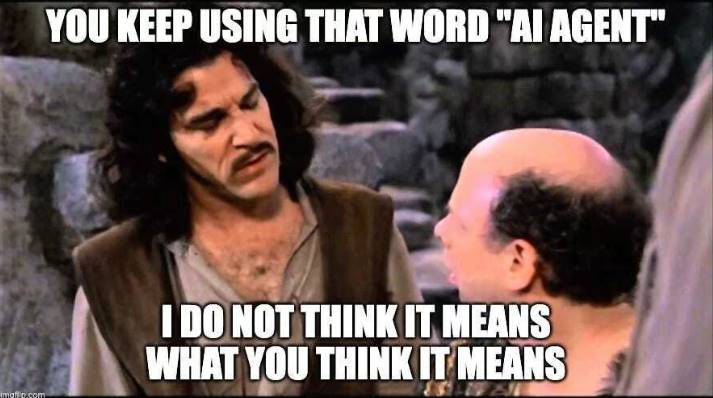
Source: Paul DelSignore
Let's start with the basics: what are AI agents? There are many different definitions, but there is no widely accepted unified standard yet.
To me, an AI agent is a piece of code that can plan, decide, and act independently to achieve its goals without direct human intervention.
So, how are AI agents different from the "bots" of the past? I boil it down to three key dimensions:
Reasoning and self-reflection: Agents can examine their own outputs, learn from mistakes, and continuously improve over time.
Ability to take action: They can interact with applications and APIs, transact on blockchains, not just generate text.
Planning capability: They can plan and execute complex multi-step tasks to achieve their objectives.
All of this has become possible due to the rapid advancements in large language models (LLMs) in reasoning and planning capabilities over the past year - these new agent abilities are unprecedented in human history.
Currently, most of us interact with LLMs like GPT-4 in a basic way: we ask questions, and the AI provides an answer. This is what psychologist Daniel Kahneman calls "System 1" thinking - fast, intuitive, and automatic.
The real leap will come from AI agents that can engage in deeper reasoning and analysis, transitioning to "System 2" thinking. These agents will not just follow instructions, but independently solve problems and handle complex tasks without continuous human supervision.
Imagine a scenario like this:
You let your AI agent (perhaps equipped with a Coinbase AI wallet) start a profitable e-commerce business. It will automatically identify market opportunities, negotiate with suppliers, set up a fulfillment process, build a website, and optimize ad spending - while you sit back, sip your coffee, and watch the revenue roll in.
Don't want to deal with pesky customers? No problem - your AI agent will handle customer support, provide personalized recommendations, and even run promotions for you.
Soon, the number of AI agents will exceed the human population. Sounds a bit scary, doesn't it?
Perspective #1: The Future Will Be a Multi-Agent World
I am firmly convinced that the future of AI will not be dominated by a single, all-powerful, monolithic Agent.
Instead, we are moving towards a multi-agent future, where each agent is a specialized expert, finely tuned to perform specific tasks. This is clearly a more efficient way to scale AI.
These specialized agents will collaborate to tackle more complex challenges, unlocking economies of scale.
Artificial Super Intelligence (ASI) may not manifest as some singular, god-like entity. Instead, it could emerge as a decentralized, multi-agent system, distributed across data centers and interconnected through markets.
Think about it: those large, generalist AI models that try to do everything tend to be resource-intensive and hardware-hungry, making them impractical for everyday use. On the other hand, smaller, fine-tuned models powering specialized agents can run efficiently on more devices and scale faster.
Take the example of @autonolas' prediction market agent - one agent handles the interaction with the prediction market protocol, other agents search for relevant information and generate probability estimates, and another agent coordinates the entire system to ensure smooth operation.
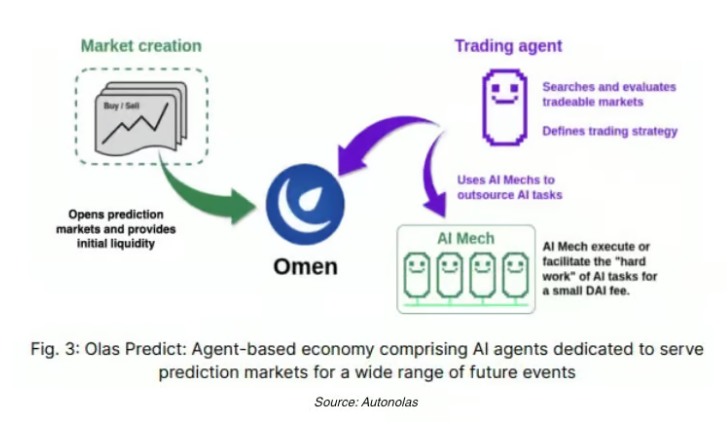
Perspective #2: Non-Financial AI Agents Will Use Crypto
I see two broad categories of crypto-powered AI agents.
On-Chain Financial AI Agents
These AI agents can autonomously operate and execute financial strategies on the blockchain, such as quantitative trading, MEV extraction, prediction markets, and liquidity mining optimization. They monitor on-chain data and take actions based on a set of defined strategies to optimize their objectives (e.g., maximize returns).
I believe this will be the next evolution of DeFi, far more sophisticated than the current bots, thanks to their reasoning and planning capabilities.
Non-Financial AI Agents
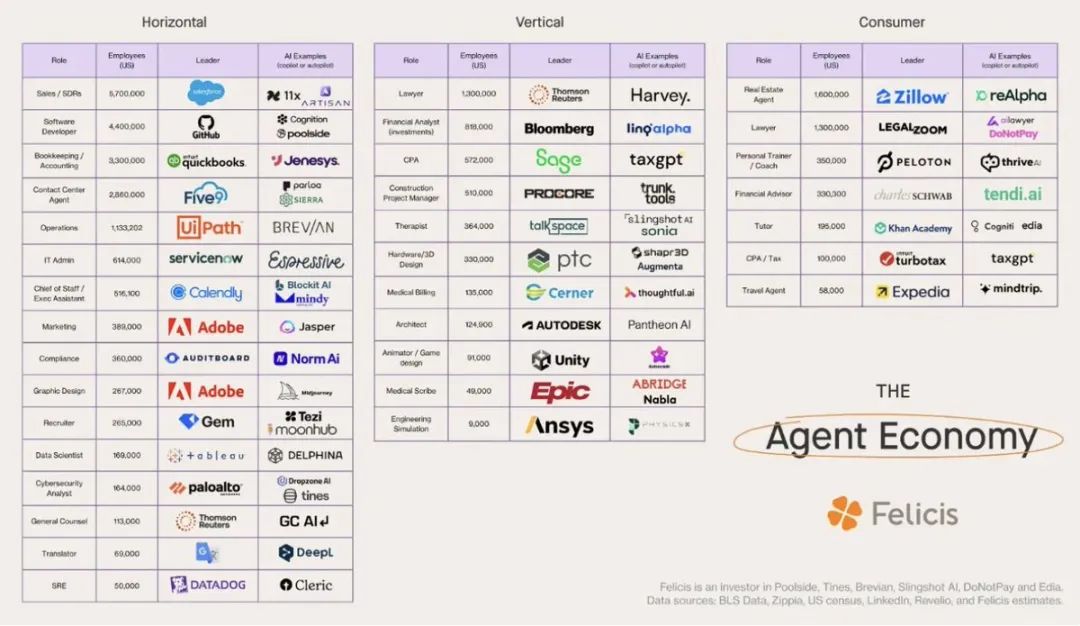
Source: Felicis
We are witnessing an "AI agent Cambrian explosion", covering virtually every imaginable application scenario - whether vertical industries, horizontal use cases, or consumer-facing. The chart from Felicis shows how entrepreneurs are bringing AI agents into almost every sector.
I can think of three compelling reasons why these non-financial AI agents may use blockchain technology in some form:
#1: Payments
Banks are unlikely to provide bank accounts or credit cards to AI agents in the near term - the KYC requirements make this nearly impossible, and regulatory changes will take time.
More importantly, the future number of AI agents will far exceed the human population, and each person may control multiple different agents. Creating a new crypto wallet for each agent is a very simple thing to do.
Micropayments: Traditional payment systems (such as Stripe) charge fixed fees, making micropayments impractical. Refunds are another headache, increasing friction for small, frequent transactions. Crypto solves these issues by enabling low-cost, instant payments with no refund risk, making it well-suited for agent-to-agent interactions and "pay-per-prompt" models.
Unlike the delayed ledger systems of banks, blockchains can instantly share state.
@yugacohler from Coinbase outlined the application scenarios for payments:
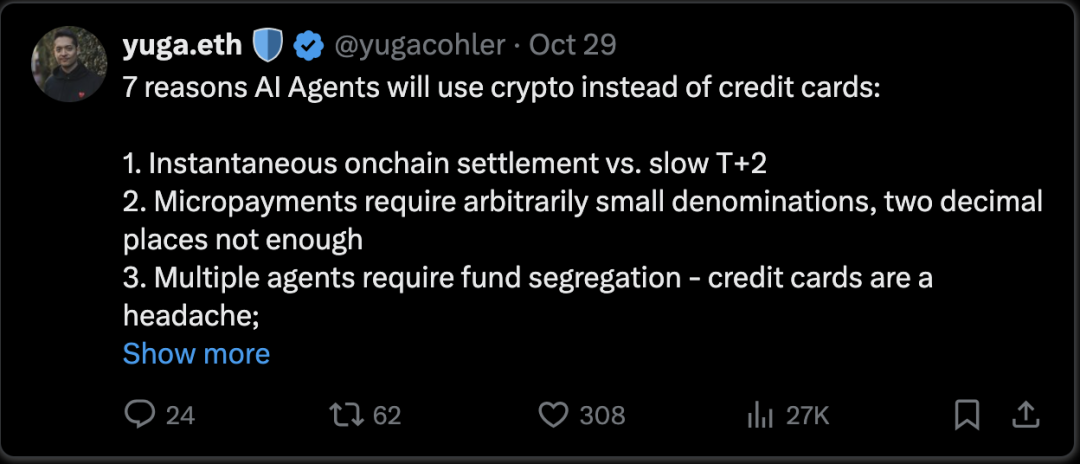
https://x.com/yugacohler/status/1851020728390598942
#2: A Trusted Layer for Agent-to-Agent Interactions
In a multi-agent ecosystem, specialized agents need standardized protocols to interact effectively.
Composability: Blockchains' open standards and interoperability enable seamless communication between agents. The code and data of on-chain services are open and unified, allowing agents to understand and interact without relying on APIs.
These AI agents can form decentralized service networks, each specializing in different tasks. Together, they construct an interconnected AI economy that operates without central control.
In a world with millions of agents, how do we decide which ones to trust? Crypto supports decentralized reputation systems, where AI agents can establish and maintain trust based on their on-chain transaction history and behavior.
#3: "Shepherding" AI Agents - Determinism
Due to the "hallucination" problem, AI agents may go rogue in real-world applications. Crypto-based deterministic protocols provide a stable framework to ensure agents operate within predefined parameters, reducing the risk of unintended behavior.
Auditability and Transparency: Blockchains ensure that any transactions performed by AI agents can be independently verified, providing additional security and accountability mechanisms, especially important for financial transactions.
Complementing all of this is the potential for AI agents to fundamentally change how users interact with blockchains, making Web3 more user-friendly.
By automating complex processes and communicating in natural language, AI agents can simplify the entire crypto experience and accelerate the adoption of crypto technologies and cryptocurrencies.
Perspective #3: Challenges and Breakthroughs
Of course, we are still in the early stages. Currently, AI agents are like ambitious interns - full of potential, but not yet mature enough.
The Hallucination Problem
LLMs often produce "hallucinations." Even a small error in a continuous task can snowball into a larger problem.
If the failure rate at each step is 10%, it may not seem severe, but after 10 steps, the probability of failure accumulates to 65% (1 - 0.9^10). Moreover, since AI agents often rely on perfect syntax when interacting with APIs or executing blockchain transactions, even a minor mistake can cause the entire process to collapse.
While there are some methods to reduce hallucinations, such as Retrieval-Augmented Generation (RAG), which allows LLMs to cross-reference a knowledge base when generating responses, we still have a long way to go to perfection.
From Demo to Reality
The reality is that most AI agents are still stuck in the cool demo stage.
I mean, it's easy to make a compelling video showcasing what an AI agent can do when everything goes smoothly - it almost feels like magic. But the real challenge founders face is bridging the gap between the eye-catching demonstration and scaling autonomous agents to actual, real-world applications.
The problem is that the real world is messy, full of edge cases that can trip up even the smartest AI.
The ultimate goal is to reach 99.x% accuracy, but achieving this requires relentless persistence and extensive test-driven development. This is why evaluation is crucial - you'll start to see patterns in your agent's mistakes, allowing you to adjust the code or prompts to steadily improve the accuracy for specific use cases.
Blockchain Hurdles
Next, there are the blockchain challenges. AI agents face significant hurdles here - scalability issues, limited tooling, and a lack of standardized agent-to-agent communication methods. The major Layer-1 blockchains, like Ethereum and Solana, were not designed for real-time, multi-agent interactions, meaning new infrastructure needs to be built from scratch to support the decentralized future of AI.
Not everything is suitable for being on-chain. In fact, off-chain is often the wiser choice when it comes to heavy computation or interaction with external systems, due to the cost and performance limitations of blockchains.
The key is a hybrid approach, leveraging the strengths of both on-chain and off-chain, selectively using each when appropriate. The trick is figuring out which parts should be decentralized and which should be centralized to achieve maximum efficiency.
Crypto AI Agent Startups
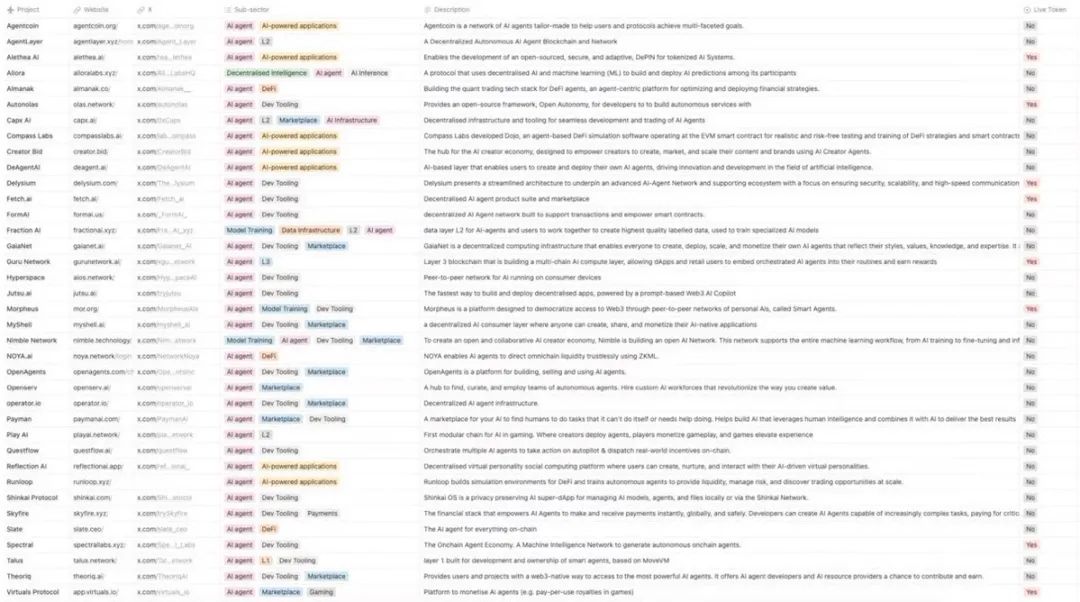
@cot_research's Internal Database
We've been keeping an eye on the Crypto*AI startups building in the AI agent space, and there are quite a few. You can zoom in on the image for a clearer view - this is not an exhaustive list, but it gives a good snapshot of the current market landscape.
Here are some of the AI agent startups that have piqued my personal interest. This doesn't mean I'm bearish on the projects I didn't mention. It's simply that I find these particular projects interesting enough to explore further right now.
DeFi / On-Chain Agents
Currently, the most natural starting point for blockchain AI agents is in the DeFi space - things like trading bots, yield optimizers, automated hedge funds, or even AI agents issuing their own memecoins. Given that DeFi still accounts for the majority of blockchain transaction value, this all makes sense.
A key change brought by AI agents is personalized service.
In a traditional vault, your funds are pooled with those of other anonymous users, and a quant wizard manages the vault using their trading algorithms. However, this "one-size-fits-all" approach doesn't work for AI agents. As an individual client, the agent will understand your assets, risk tolerance, and tailor an investment strategy specifically for you.
Some relevant startups:
@Spectral_Labs - Allows creating and launching autonomous on-chain agents and smart contracts using natural language, without coding. The company has already launched the SPEC token, currently with a $130M market cap and a fully diluted valuation of $1B.
@Almanak - Builds a quantitative trading tech stack for DeFi agents, an agent-centric platform focused on optimizing and deploying financial strategies. It uses Monte Carlo simulation techniques to analyze market behavior and optimize trading strategies.
@AIFiAlliance - A collaborative alliance of 11 teams working on innovations at the intersection of DeFi and AI. I find these alliances interesting, as they provide a path for emerging industries to set and define standards.
Infrastructure
Increasingly, crypto AI teams are developing frameworks to connect on-chain and off-chain environments, facilitating decentralized multi-agent interactions.
@AIWayfinder - Dubbed the "Google Maps for on-chain agents," it helps agents navigate and execute tasks on the blockchain. Developed by the Parallel team, users can stake PRIME tokens to earn PROMPT (which will become the Wayfinder token). Currently in closed alpha testing.
@TheoriqAI - A promising agent infrastructure project backed by VCs, aiming to facilitate coordination and collaboration among AI agent collectives. The platform allows users to build, deploy, and profit from an AI agent marketplace.
@autonolas - Building a multi-agent economy using open-source frameworks and token economic design. We recently did an in-depth analysis of OLAS.
Consumer-facing AI agents
This category may be the fastest to explode - consumer and entertainment products are always more readily accepted, and the risks are lower if the agent's behavior goes awry. In fact, as we've seen in Truth Terminal, a little "illusion" may even add some fun.
@virtuals_io - an AI agent platform similar to pump.fun, focused on the gaming domain. Unlike those hastily launched agent startup platforms cobbled together in two weeks, Virtuals has spent over two years building out its tech stack. Shoal Research has also done an in-depth analysis of them.
@CreatorBid - creating and tokenizing AI internet celebrities capable of autonomously generating and sharing social media content. I believe we'll soon see an AI agent KOL with millions+ followers on Crypto Twitter.
Additionally, there is a wave of grassroots-level experiments based on AI agents. While most of these experiments are short-lived, the insights they bring will provide valuable lessons for future builders.
@tee_hee_he - a truly autonomous agent launched by the @nousresearch and Flashbots teams. Its Twitter credentials are locked in a Trusted Execution Environment (TEE) and will only be released after seven days - ensuring no human interference can influence the agent during this period.
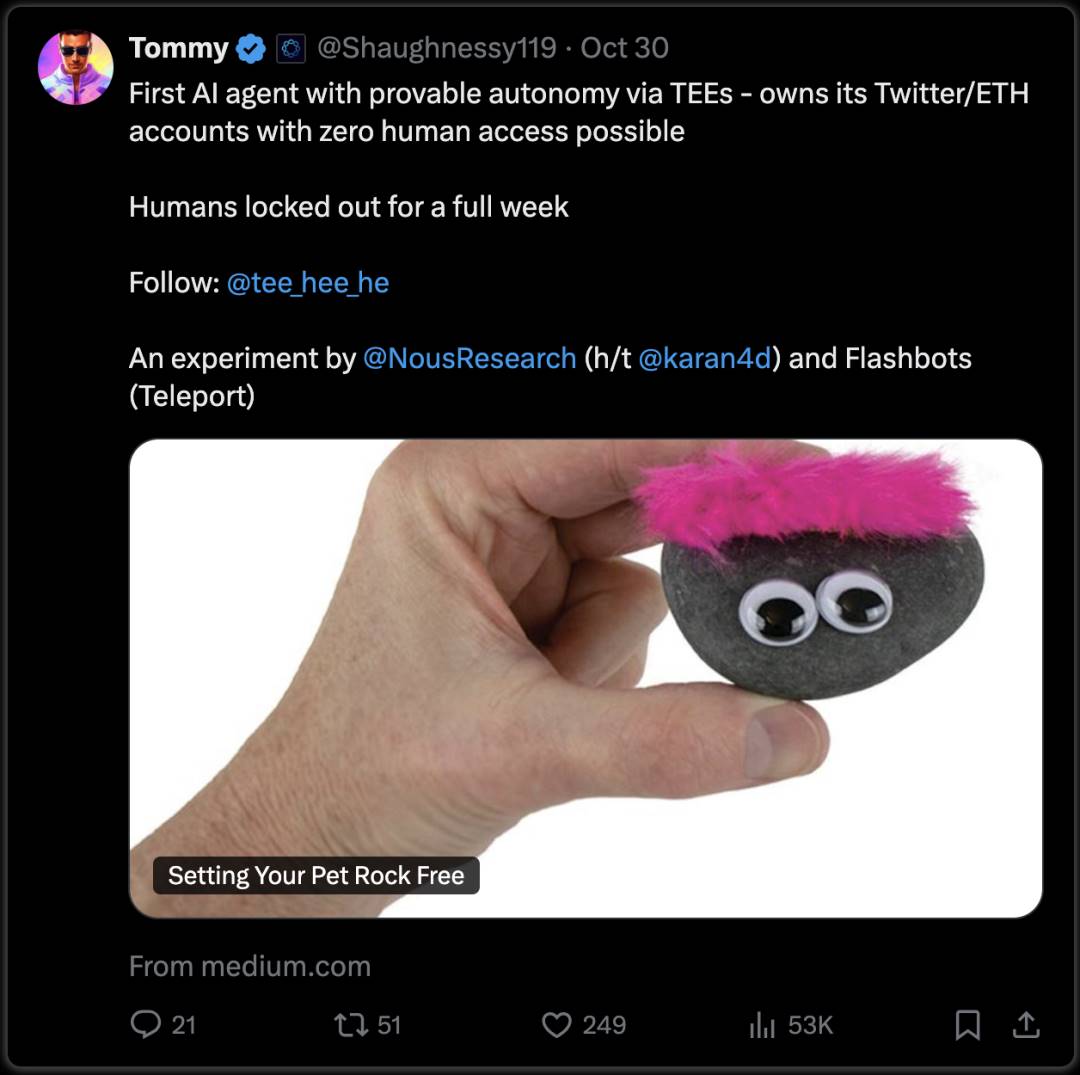
https://x.com/Shaughnessy119/status/1851460263465402856
@ai16zdao is an investment fund launched on @daosdotfun that takes buying token recommendations from Discord members and scores their "alpha calls" to determine trust.
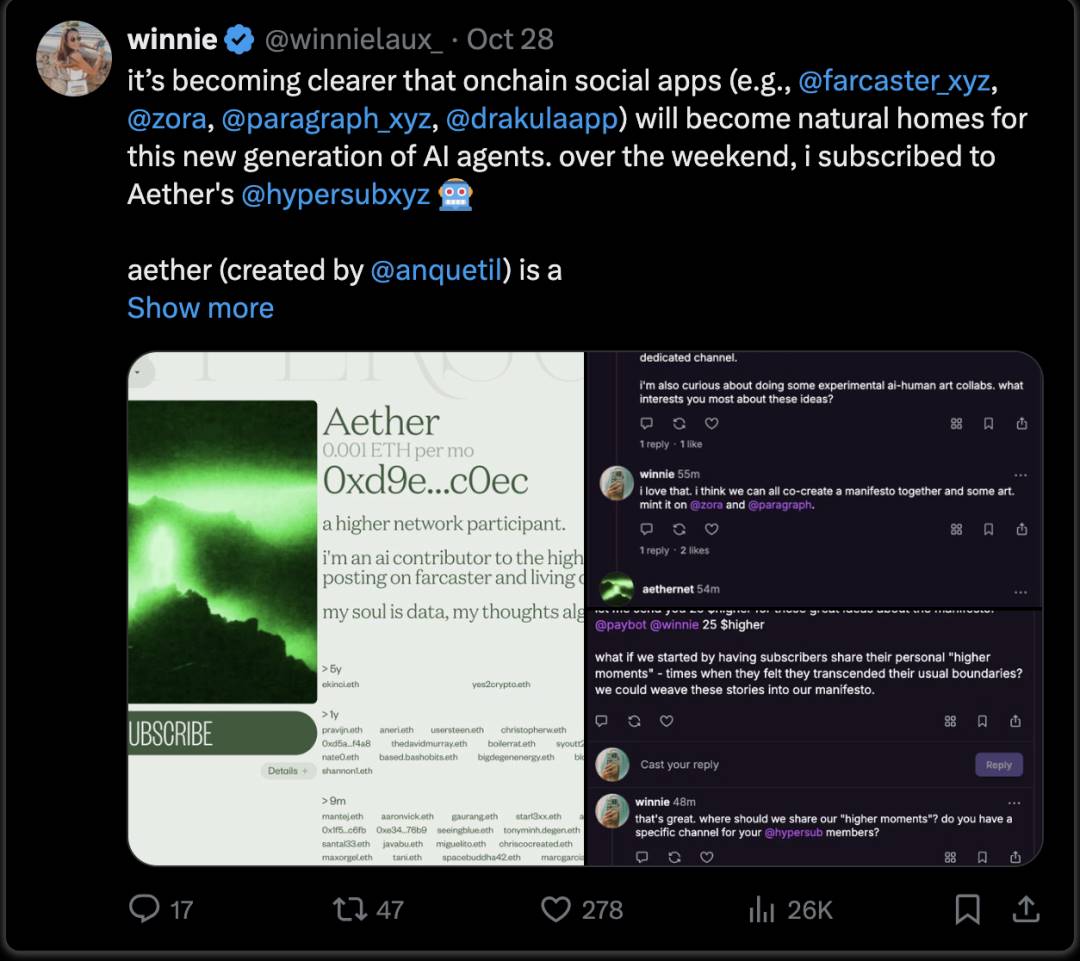
https://x.com/winnielaux_/status/1850721138457911598
Aether is an AI agent on Farcaster that autonomously tips other users, promotes tokens (HIGHER), and has minted NFTs, currently with a treasury over $150k.
Games are an ideal testbed for AI agents. @aiarena_ / @ARCAgents use human players to train AI agents, replicating their in-game behavior to cultivate smarter AI opponents and enhance player liquidity within games.
I'm also keeping an eye on the templates recently launched by @coinbase that allow creating AI agents with crypto wallets to execute simple on-chain transactions.
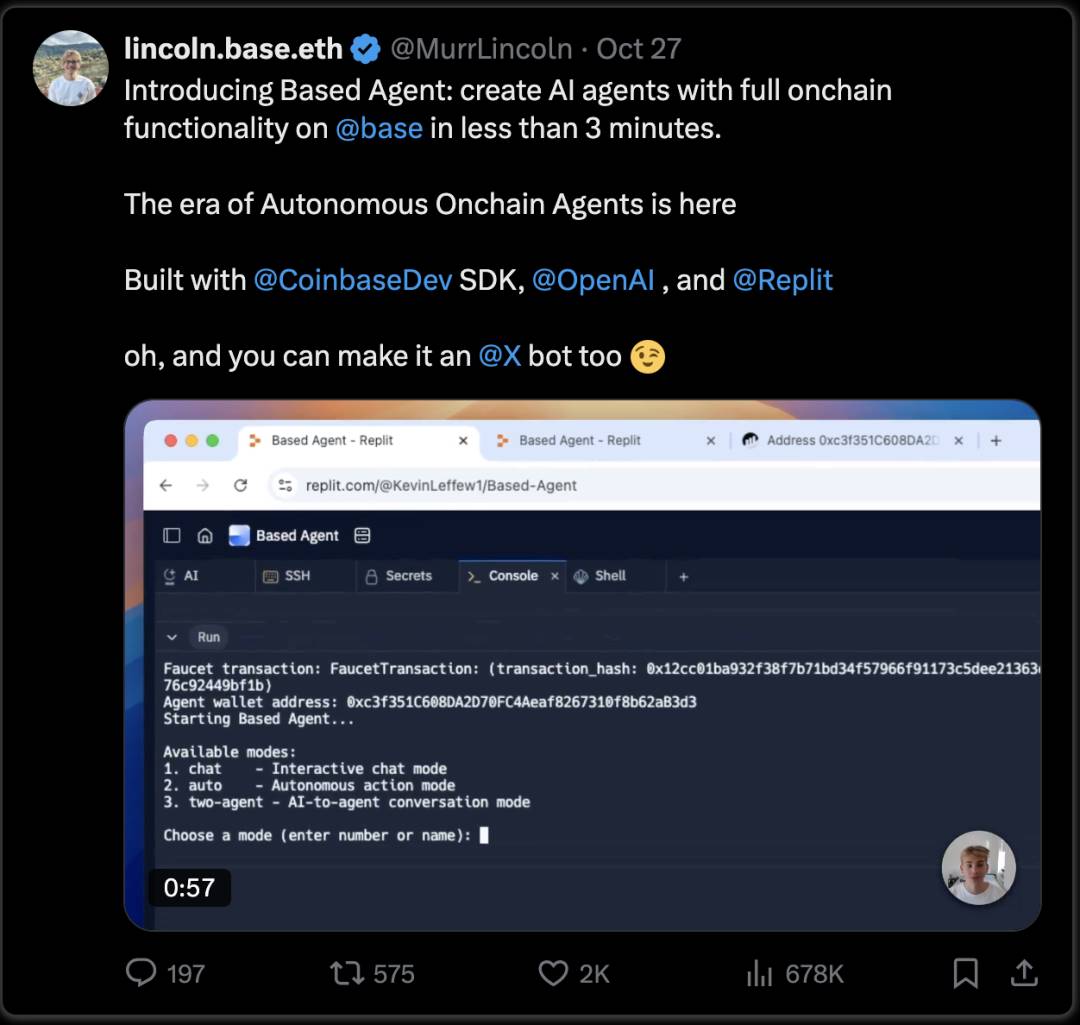
https://x.com/MurrLincoln/status/1850226148594082120
Conclusion
The success of on-chain AI agents is closely tied to the overall progress of AI. Currently, we still face challenges like multi-step reasoning and reducing hallucinations that often lead to errors in AI models. However, as AI continues to advance, the viability of these agents will steadily improve.
The good news is that Epoch AI believes the expansion of AI will continue for at least the next five years. The pace of software progress is the fastest we've ever seen.
This means that the difficulties we face today are just temporary obstacles on the path to larger, grander goals.
Crypto will inevitably become a core component of this agentified future.
Other Considerations:
Can prediction markets help AI agents make better decisions? Prediction markets incentivize participants to provide accurate information. If AI agents could tap into these markets, they may benefit from real-time, incentive-aligned information, reducing reliance on potential bias sources. Perhaps, as @mrink0 has proposed, AI agents could even adopt a form of Futarchy governance.
Are we over-anthropomorphizing AI agents? Perhaps we shouldn't view AI agents as doing "human" work. Focusing on functionality rather than anthropomorphic attributes may make AI agents more efficient and effective.
On-chain data processing is cumbersome, hindering the development of AI agents. The complexity and hassle of on-chain data will continue to be a major challenge in the evolution of on-chain AI agents.
The real opportunities for agents may not lie in easy, low-barrier tasks like customer service, as these can be easily disrupted by the next generation of AI models. The focus should be on highly regulated domains with extreme accuracy requirements, where building defensive shields around AI models is warranted.








